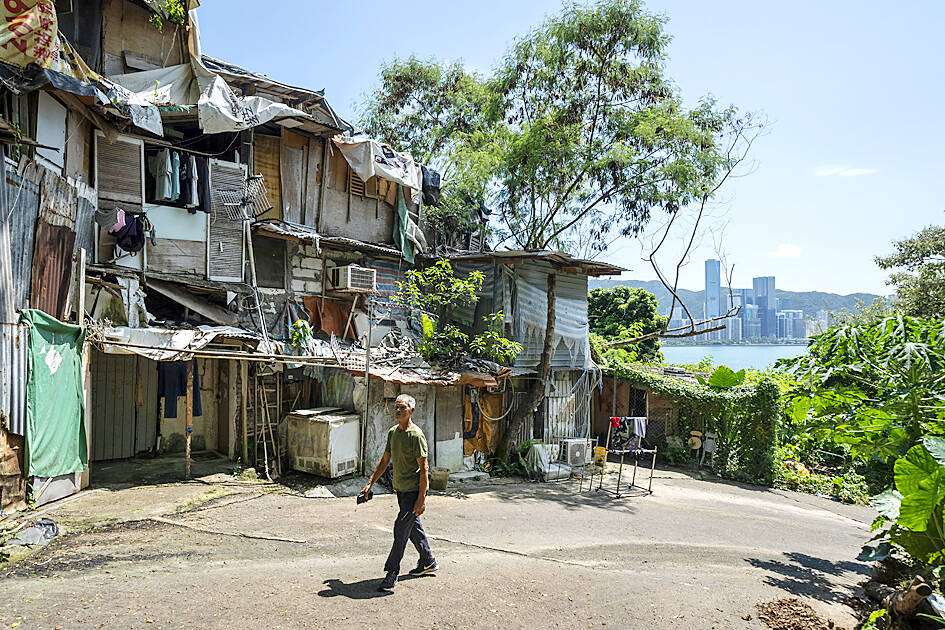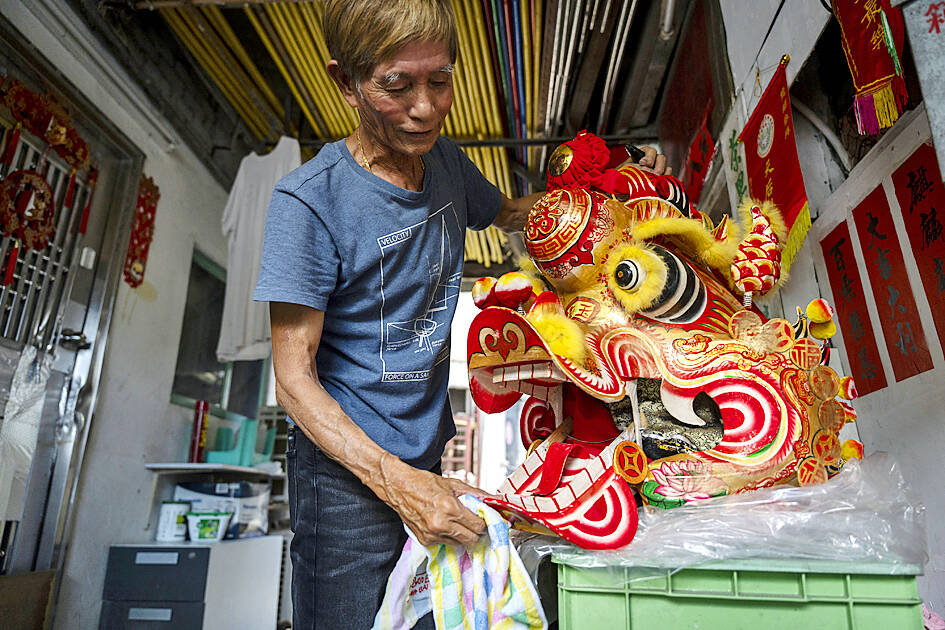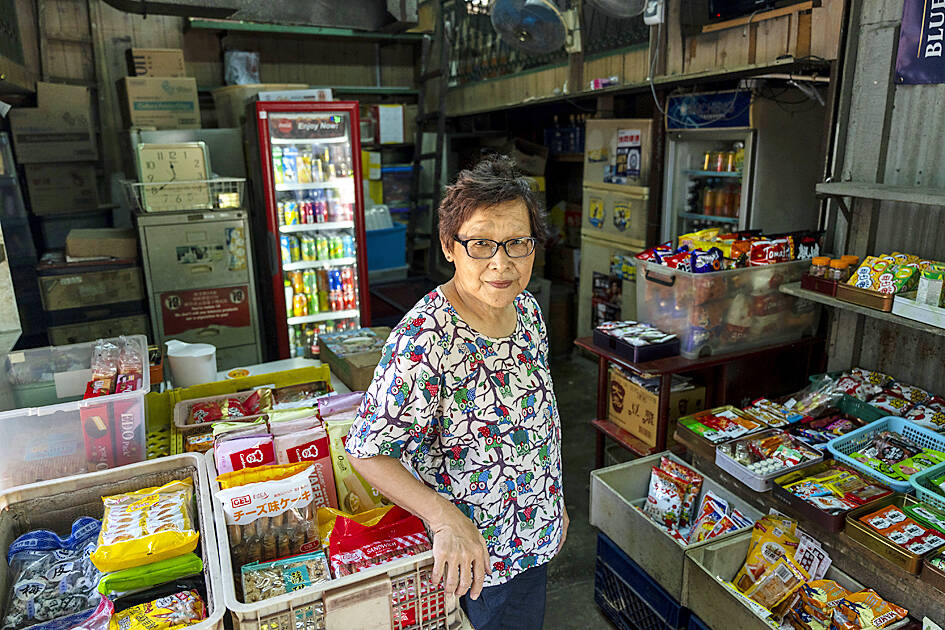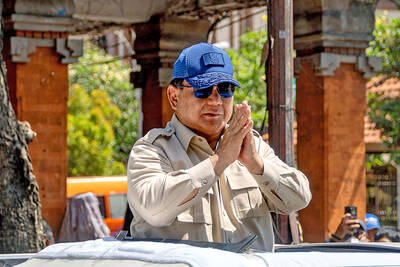In months, Lo Yuet-ping would bid farewell to a centuries-old village he has called home in Hong Kong for more than seven decades.
The Cha Kwo Ling village in east Kowloon is filled with small houses built from metal sheets and stones, as well as old granite buildings, contrasting sharply with the high-rise structures that dominate much of the Asian financial hub.
Lo, 72, has spent his entire life here and is among an estimated 860 households required to move under a government redevelopment plan.

Photo: AP
He said he would miss the rich history, unique culture and warm interpersonal kindness that defined life in the village.
“I’m unwilling to part with anything,” said Lo, who expects to be relocated to a newer district of east Kowloon.
The demolition of the Cha Kwo Ling village, set to enter its final phase next year, is erasing one of Hong Kong’s last remaining squatter villages, making way for public housing. The settlement has witnessed the former British colony’s transformation from a fishing village to an industrial hub and finally to a global financial center.

Photo: AP
Originally a settlement for Hakka people, Cha Kwo Ling saw an influx of mainland Chinese immigrants over the years, just like other squatter villages in the territory.
Some of the immigrants arrived between the late 1940s and 1950s, fleeing the Chinese Civil War or seeking better economic opportunities. The influx swelled Hong Kong’s population from 600,000 in 1945 to 2 million by 1950, a government Web site says.
Unable to afford housing, many people built wooden homes in squatter villages. In 1953, an estimated 300,000 people were living in such settlements across the territory.

Photo: AP
Researcher Charles Fung (馮志強), coauthor of a book on the territory’s squatter housing, described how people built squatter houses as part of a “catch-me-if-you-can game” with the authorities in British colonial times.
Fung said that the government would not have to provide resettlement commitments for homeowners if it managed to demolish the structures before people moved into them.
That led people to cut wood and build houses at night along hillsides where they were difficult to find, he said.
While the structures looked vulnerable, the villages played a crucial role in supporting Hong Kong’s economy, he said.
They hosted small factories and were located near industrial zones, informally bolstering the territory’s factory system during its time as a manufacturing hub, he said.
However, the precarious nature of the settlements came with risks. Fires in squatter houses have always been a concern and helped drive the British colonial government to resettle residents into public housing.
Officially, the public housing policy is presented as help for the fire victims in the squatter villages, but research suggests other political factors were at play, Fung said.
One such factor was the British government’s desire to prevent interference from mainland China, which wanted to send a delegation to help displaced villagers after a fire in the early 1950s.
“Now we see how the landscape of Hong Kong is tremendously shaped by the building of public housing, where people locate in different areas and build their own lives,” Fund said.
In Cha Kwo Ling, Lo expressed reservations about moving into a high-rise building.
He has built a lifetime of memories in the village, from being part of its lion dance team from a young age to serving on the volunteer fire prevention team. He worked as a driver in the village’s quarry, which had supplied stones to build the territory’s top court and to neighboring Guangzhou and Southeast Asia.
“I’ve grown accustomed to living here,” he said.
Even after being forced to relocate due to fires, some former residents found themselves drawn back to the village, maintaining their ties to the community.
Teoh Bee Hua, a Malaysian who moved to Cha Kwo Ling after marrying a villager in 1973, kept operating her grocery shop there even though she no longer lives in the village after a fire.
Teoh, in her 70s, said she used to chat with her neighbors and held barbecue and hot pot gatherings with them, saying that “those were the happy days.”
She said she would close her shop when the relocation time comes, marking the end of an era as she retires for good.
“There’s nothing you can do. We will surely part. There are gatherings and partings in life. That’s how life is,” she said.

DEADLOCK: Putin has vowed to continue fighting unless Ukraine cedes more land, while talks have been paused with no immediate results expected, the Kremlin said Russia on Friday said that peace talks with Kyiv were on “pause” as Ukrainian President Volodymyr Zelenskiy warned that Russian President Vladimir Putin still wanted to capture the whole of Ukraine. Meanwhile, US President Donald Trump said that he was running out of patience with Putin, and the NATO alliance said it would bolster its eastern front after Russian drones were shot down in Polish airspace this week. The latest blow to faltering diplomacy came as Russia’s army staged major military drills with its key ally Belarus. Despite Trump forcing the warring sides to hold direct talks and hosting Putin in Alaska, there

North Korea has executed people for watching or distributing foreign television shows, including popular South Korean dramas, as part of an intensifying crackdown on personal freedoms, a UN human rights report said on Friday. Surveillance has grown more pervasive since 2014 with the help of new technologies, while punishments have become harsher — including the introduction of the death penalty for offences such as sharing foreign TV dramas, the report said. The curbs make North Korea the most restrictive country in the world, said the 14-page UN report, which was based on interviews with more than 300 witnesses and victims who had

COMFORT WOMEN CLASH: Japan has strongly rejected South Korean court rulings ordering the government to provide reparations to Korean victims of sexual slavery The Japanese government yesterday defended its stance on wartime sexual slavery and described South Korean court rulings ordering Japanese compensation as violations of international law, after UN investigators criticized Tokyo for failing to ensure truth-finding and reparations for the victims. In its own response to UN human rights rapporteurs, South Korea called on Japan to “squarely face up to our painful history” and cited how Tokyo’s refusal to comply with court orders have denied the victims payment. The statements underscored how the two Asian US allies still hold key differences on the issue, even as they pause their on-and-off disputes over historical

CONSOLIDATION: The Indonesian president has used the moment to replace figures from former president Jokowi’s tenure with loyal allies In removing Indonesia’s finance minister and U-turning on protester demands, the leader of Southeast Asia’s biggest economy is scrambling to restore public trust while seizing a chance to install loyalists after deadly riots last month, experts say. Demonstrations that were sparked by low wages, unemployment and anger over lawmakers’ lavish perks grew after footage spread of a paramilitary police vehicle running over a delivery motorcycle driver. The ensuing riots, which rights groups say left at least 10 dead and hundreds detained, were the biggest of Indonesian President Prabowo Subianto’s term, and the ex-general is now calling on the public to restore their